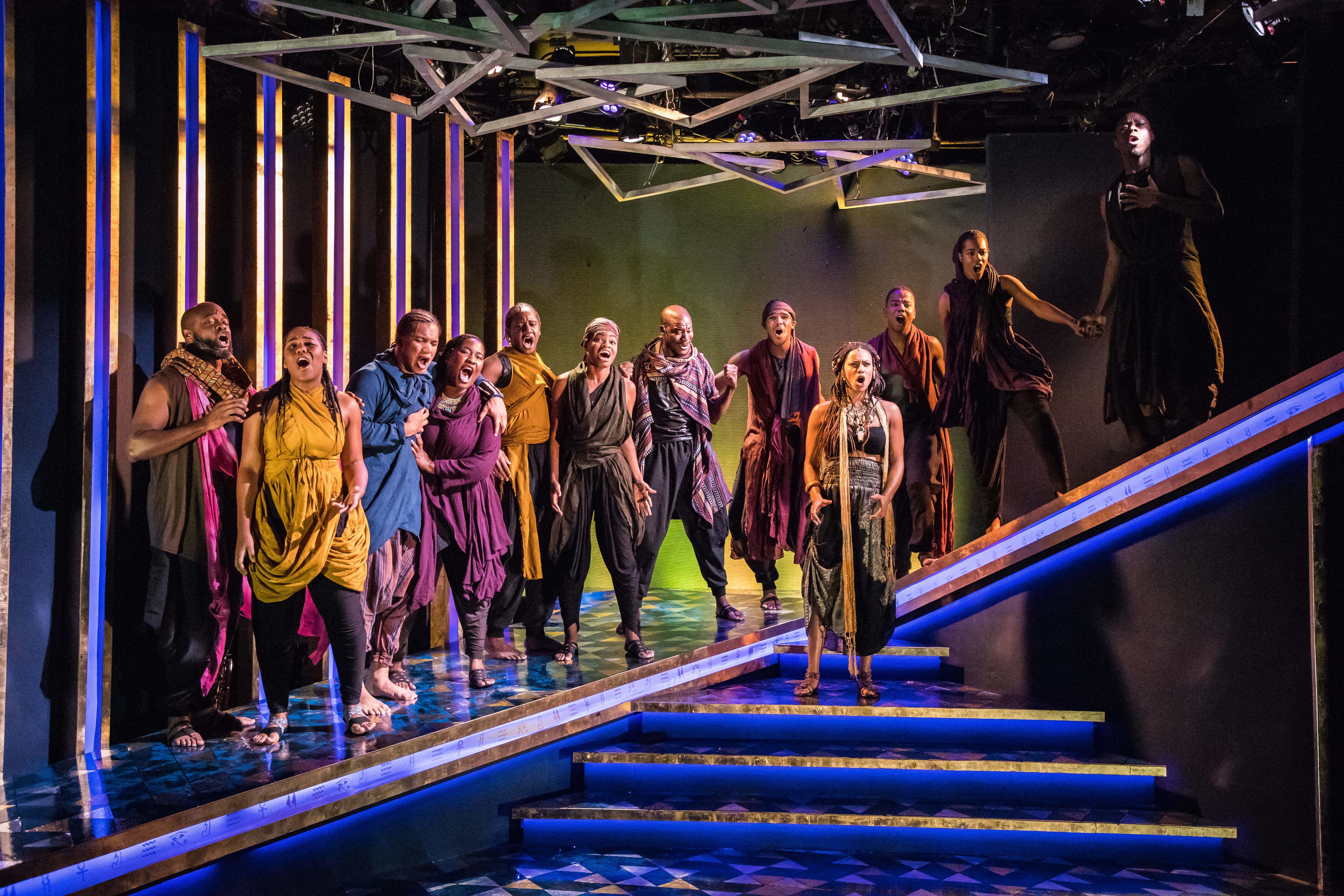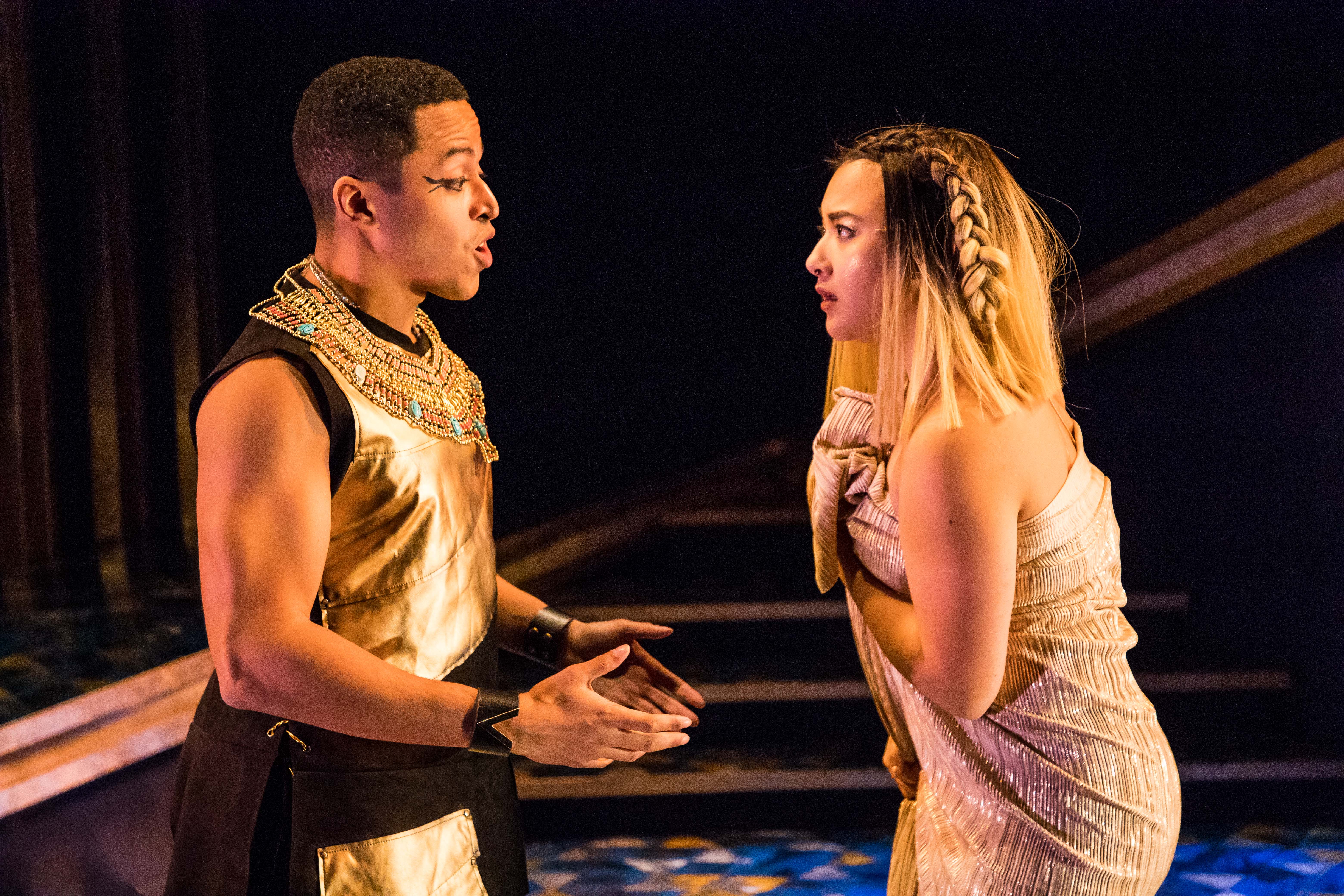Just before intermission in Constellation Theatre Company’s sparkling and stirring production of Aida, there comes a wonderful “Wakanda Forever” moment. The fearless Nubian princess Aida (a majestically poised Shayla S. Simmons), captured with her countrypeople who are now enslaved in Egypt, lifts their persecuted spirits with “The Gods Love Nubia.” The ensemble joins in the musical number, as do Aida’s allies, the house slaves Mereb and Nehebka (Da’Von Moody and Ashley Johnson-Moore, both magnetically poignant):
The gods love Nubia
We have to keep believing
Though scattered and divided we are still its heart
And the singing is absolutely glorious.
For anyone wondering how in the world this mammoth Broadway musical could work in a modest blackbox on 14th Street, here’s the answer: a pulse beat of conviction among the performers so persuasive it’s as if this epic myth were their own.
The storyline of Aida the musical, which is set in 3000 B.C.E., is of course not native to anywhere on the continent of Africa. It began as an opera written by Italians in the nineteenth century, then in the twentieth it was made a musical by Disney with music and lyrics by two Brits. Book writers Linda Woolverton, Robert Falls, and David Henry Hwang have done a crafty job of making the roundabout plot relatable, and Elton John’s music and Tim Rice’s lyrics are terrifically listenable. But in lieu of the legendary pageantry of both opera house and Broadway versions of Aida, what makes Constellation’s show soar is its opulence of talent.

Scenic and Lighting Designer A. J. Guban—perhaps referencing the pyramids, or maybe the loves of the three leads—sets the story amid a profusion of triangles: on the floor in a pattern of blue, black, gold, and silver; overhead in frames; and onstage in forced-perspective shapes and angles that light up in bright colors. Even more spectacular are Costume Designer Kenann M. Quander’s jewel-bedecked and gilded high fashions for Egyptian royalty, uniforms and gowns for their minions, and earth-toned rags for their slaves. Notably, the fashionista Egyptian princess Amneris (a spunkily comic Chani Wereley) gets her vanity on in a succession of outfits each more eye-popping than the last.
The show could well be called Radames and Aida, for their love, à la R&J, transgresses and transcends a boundary between hatreds. Radames (a strapping, lovely-voiced Jobari Parker-Namdar) is the Egyptian captain who invaded Ethiopia and captured among his conquests the beautiful Aida. Radames becomes fatefully infatuated with Aida; her self-possessed feistiness arrests him—but he’s already engaged to material girl Amneris.

Among the intriguing aspects of the script is the fact that each of the three romantic leads—Radames, Aida, and Amneris—has a father who plays a differently pivotal role in their lives and the story. Amneris is daughter to Pharaoh (a handsomely authoritative Kaylen Morgan), so when Radames marries her he will have a son-in-law’s sinecure. Aida is daughter to Amonasro, king of Nubia (a sensitively dignified Wendell Jordan), who loves her dearly but is affronted that she would fall for an Egyptian. And good guy Radames is son to the evil and conniving chief minister Zoser (a deliciously malicious Greg Watkins), who intends to ensure his son’s enthronement by offing the Pharaoh.
Director Michael J. Bobbitt, Musical Director Walter “Bobby” McCoy, and Choreographer Tony Thomas II have together triangulated a compelling production with a first-rate cast of actor-singer-dancers and a band so well balanced by Sound Designer Roc Lee that we hear every musical nuance, every emotional note.
Read ‘Perhaps He’s a Prodigy.’ How Walter “Bobby” McCoy Went From High School to the Heights of DC Theater, an interview with the musical director of Aida, by Nicolle Hertvik
A few highlights for me (besides the thrilling “The Gods Love Nubia”) were “How I Know You,” in which Aida and Mereb recognize each other as compatriots, tenderly sung by Simmons and Moody; “My Strongest Suit,” in which Amneris and her Attendants go clothes crazy, hilariously sung by Wereley and ensemble; “Elaborate Lives,” in which Radames declares his love for Aida, gorgeously sung by Parker-Namdar and Simmons and reprised movingly as they await their tragic entombment.

Aida the musical is a big show, with an epic story and outsize characters. But up close in small at Source, performed with artistry and affinity, it just couldn’t feel any better.
Running Time: Two hours and 15 minutes, including one intermission.
Aida plays through November 18, 2018, presented by Constellation Theatre Company performing at Source Source – 1835 14th Street, NW, in Washington, DC. For tickets, call the box office at (202) 204-7763, or purchase them online.
Credits
Music by Elton John Lyrics by Tim Rice
Book by Linda Woolverton, Robert Falls & David Henry Hwang
Directed by Michael J. Babbitt Musical direction by Walter “Bobby” McCoy
Choreography by Tony Thomas II
Scenic/Lighting Designer: A.J. Guban
Costume Designer: Kenann M. Quander
Sound Designer: Roc Lee
Properties Designer: Tony Koehler
Fight Choreographer: Ryan Sellers
Associate Music Director: Marika Contouris
Production Stage Manager Kirsten E. Parker
Assistant Director: Sean-Maurice Lynch
Assistant Choreographer: Patricia “Pep” Targete
CAST
Aida: Shayla S. Simmons
Radames: Jobari Parker-Namdar
Amneris: Chani Wereley
Zoser: Greg Watkins
Mereb: Da’Von Moody
Nehebka: Ashley John
Amonasro: Wendell Jordan
Pharaoh: Kaylen Morgan
Ensemble: lan Anthony Coleman, Lawrence Hailes, Ashley Johnson-Moore, Amber Lenell Jones, Wendell Jordan, Kaylen Morgan, Ashley K. Nicholas, Greg Watkins, Topher Williams, Tara Lynn Yates-Reeves
BAND
Conductor/Keyboard 1: Walter “Bobby” McCoy
Keyboard 2: Marika Countouris
Flute, Alto Flute, Bamboo Flute, Oboe, English Horn, Alto Saxophone: Mila Weiss
Guitars: Jaime Ibacache
Bass: Jason Wilson
Drums/Percussion: Manny Ardniega
UNDERSTUDIES
Demitrus “Demie” Carter (Amonasro/Ensemble); Takara Clark (Ensemble); Candace Foreman (Ensemble); Amber Lenell Jones (Nehebka); Wendell Jordan (Zoser); Benjamin Kramer Kwalick (Ensemble); Ahmad Maaty (Pharaoh/Ensemble); Da’Von Moody (Radames); Nia Savoy (Amneris); Topher Williams (Mereb); Tara Lynn Yates-Reeves (Aida)




